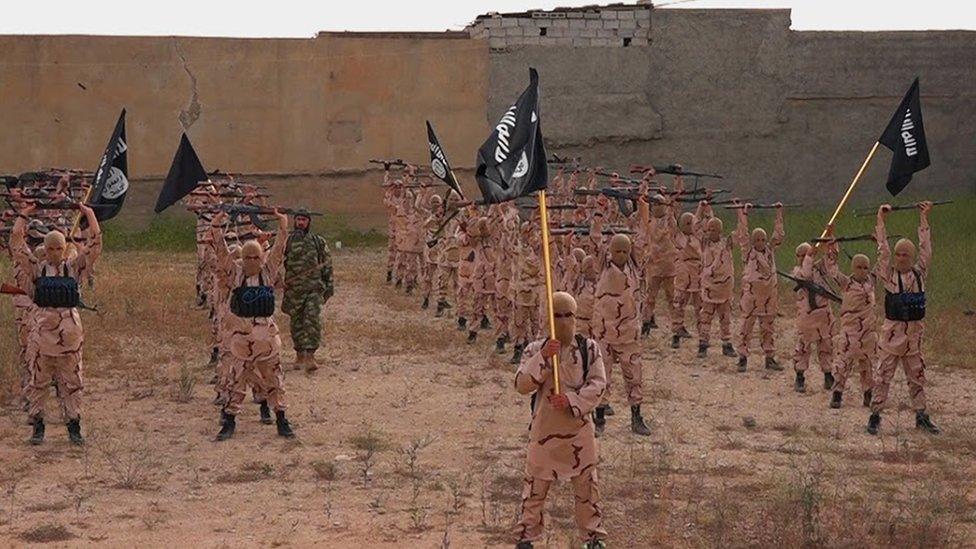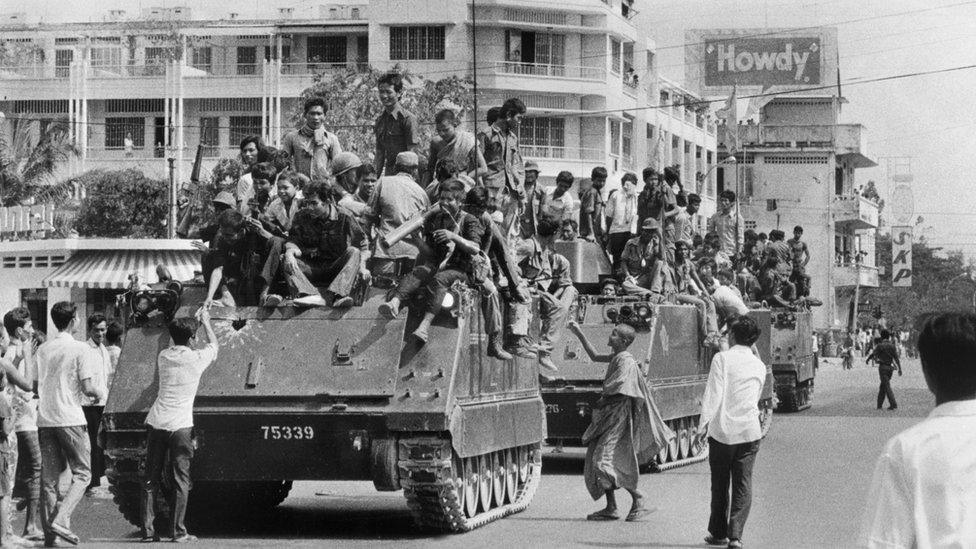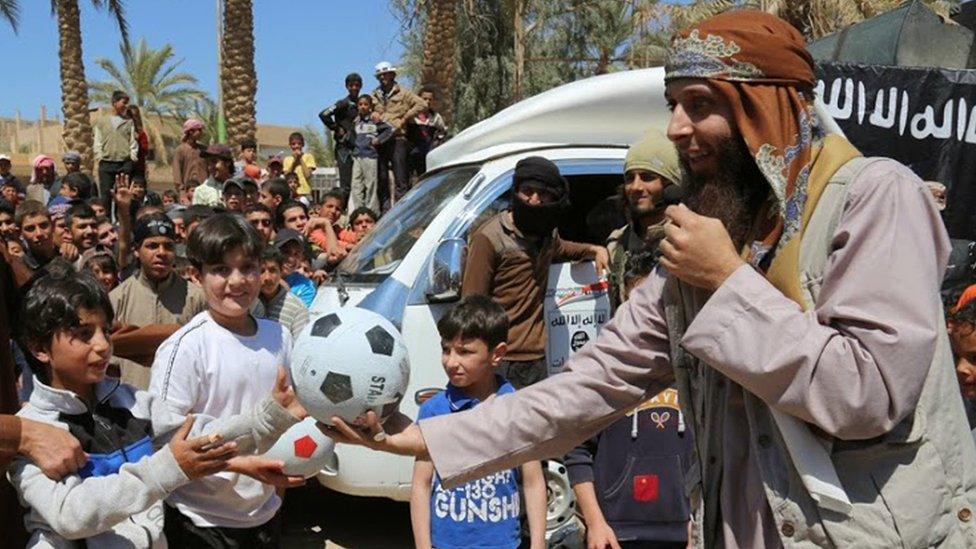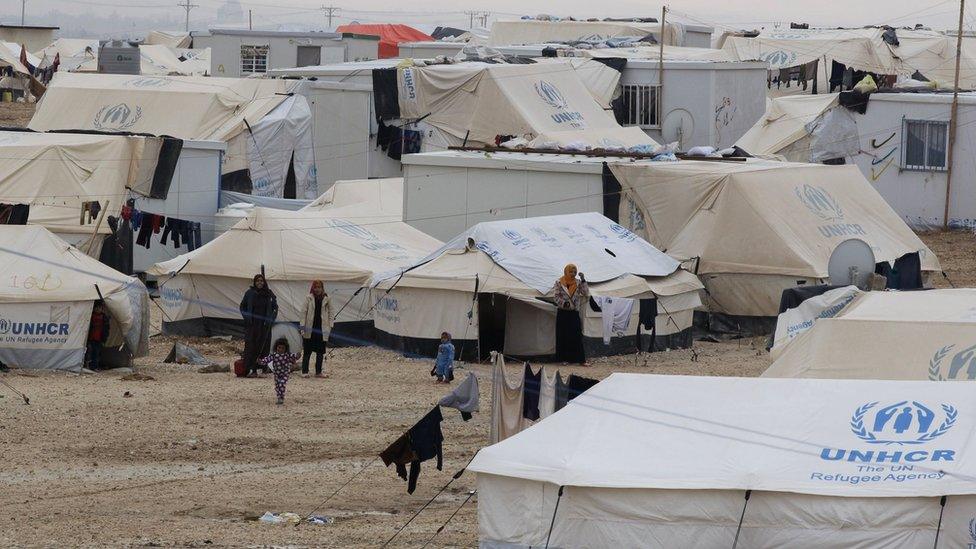Islamic State moulds children into new generation of militants
- Published

The UN has accused IS of instrumentalising and abusing children on a massive scale
France's first air strike targeting Islamic State (IS) in Syria is reported to have killed 12 children recruited by the jihadist group.
Their deaths have highlighted how the young populations of Syria and Iraq are being moulded into a new generation of militants, writes Jessica Stern.
IS recruits children to use them as human shields, fighters, suicide bombers, snipers, and blood donors.
In July 2015, IS released a video of what is believed to be the group's first recorded beheading by a child soldier, external. Children have also reportedly been instructed by IS militants to shoot captives. , external
The Syrian Observatory for Human Rights said in July 2015 that IS had used as many as 19 children as suicide bombers. The report, external announced that at least 52 children under the age of 16 had died fighting for IS so far in 2015.
Residents of Raqqa told Syria Deeply, external that children were taught in ISIS training camps how to behead another human being, and were given blonde dolls on which to practise.
One child told Human Rights Watch, external: "When [IS] came to my town... I liked what they are wearing, they were like one herd. They had a lot of weapons. So I spoke to them, and decided to go to their training camp in Kafr Hamra in Aleppo."
He attended the camp when he was 16 years old, but the leader told him he preferred younger trainees.
Systematic indoctrination
IS is what sociologist Erving Goffman referred to as a "total institution", external, which he defined as one that "has more or less monopoly control of its members' everyday life".
Like other total institutions, IS aims to create a new form of man.
Young children are easier to mould into the IS vision of this new man.
This is a hallmark of a total institution - seen when Pol Pot experimented with creating a utopia in Kampuchea (the name used for Cambodia when the Khmer Rouge controlled it) in the 1970s, using methods not that different from those employed by IS.

The Khmer Rouge educated children "according to the precepts of the revolution" in Cambodia
The idea was to create an entirely new society, uncontaminated by the values the Khmer Rouge aimed to stamp out.
Children were seen as the least corrupted by bourgeois values and would be educated "according to the precepts of the revolution", which did not include traditional subjects.
As was the case for the Khmer Rouge, the children of IS are both victims and perpetrators of terror.
As psychiatrist Otto Kernberg explains: "Individuals born into a totalitarian system and educated by it from early childhood have very little choice to escape from total identification with that system... Totalitarian educational systems permit a systematic indoctrination of children and youth into the dominant ideology", especially when they are young.
Financial incentives
According to the research of Mia Bloom and John Horgan, external of Georgia State University, IS follows a trend of training ever-younger operatives.
By doing so they hope to ensure a new generation of fighters.
Leadership decapitation is significantly less likely to be effective against organisations that prepare children to step into their fathers' shoes.
Some of the children come with their families from abroad, to grow up in what their parents see as a pure Islamic state.
They learn to say that they are citizens of this Islamic state rather than from their country of origin.
But financial desperation is also a factor.
IS heavily taxes populations under its control, external in Iraq and Syria while raising the prices of essential goods.

In Syria, IS pays parents and bribes children to attend its training camps
The economic situation is further exacerbated by US-led coalition air strikes, which have disrupted the oil-based economy upon which many civilians' livelihoods depend.
As a result, Iraqis and Syrians have found themselves bankrupt with no means to provide for themselves or their families.
This financial burden, external has pushed some parents, particularly in Syria, to send their children to fight for IS in order to make a living wage to support the family.
In Raqqa, IS pays parents and bribes children to attend its training camps.
In June, the UN Office of the Special Representative of the Secretary-General for Children and Armed Conflict reported, external that in some cases, child soldiers have been paid salaries of up to $400 (£260) per month.
Children in refugee camps are especially vulnerable to recruitment.
Romeo Dallaire, the founder of the Child Soldiers Initiative, explains, external the allure of IS for refugees: "Trying to talk to young people who have absolutely no hope, no school, just aimlessly waiting in very difficult living conditions... when people get through to them and say, 'You might as well cross the border and come and fight.' Even 13-year-olds are attracted by that."
IS militants have recruited young opposition fighters, external from the Free Syrian Army (FSA) by promising them amnesty in exchange for their service in IS ranks.
After leaving the FSA, the children are sent to IS indoctrination schools and brainwashed before being sent into battle.
'Abuse on industrial scale'
But the recruits are not always volunteers.
Children of ethnic and religious minorities, particularly the Kurds and Yazidis, have been kidnapped and forced to join IS.
According to Syrian Observatory for Human Rights, in one case, external, more than 600 Kurdish students were kidnapped on their way home from taking exams in Aleppo.

Children in refugee camps are especially vulnerable to recruitment by jihadists
Their captors gave the boys an Islamic "education", encouraging them to join the jihad, showing them videos of beheadings and suicide attacks.
A February 2015 report by the United Nations Committee on the Rights of the Child concluded, external that IS had used "mentally challenged" children as suicide bombers.
IS has brutalised children who do not co-operate as soldiers.
In August 2015 militants reportedly chopped off the right hand and left foot, external of a 14-year-old Syrian boy who refused to fight.
Lt-Gen H R McMaster is director of the Army Capabilities Integration Center (ARCIC), US Army Training and Doctrine Command. His job is to assess threats of the future for the U.S. Army.
He describes IS, external as "engaging in child abuse on an industrial scale".
"They brutalise and systematically dehumanise the young populations. This is going to be a multigenerational problem."
Jessica Stern is a Lecturer on Terrorism at Harvard University, an Advanced Academic Candidate at the Massachusetts Institute of Psychoanalysis and serves on the Hoover Institution Task Force on National Security and Law. She is a co-author of: ISIS: The State of Terror.